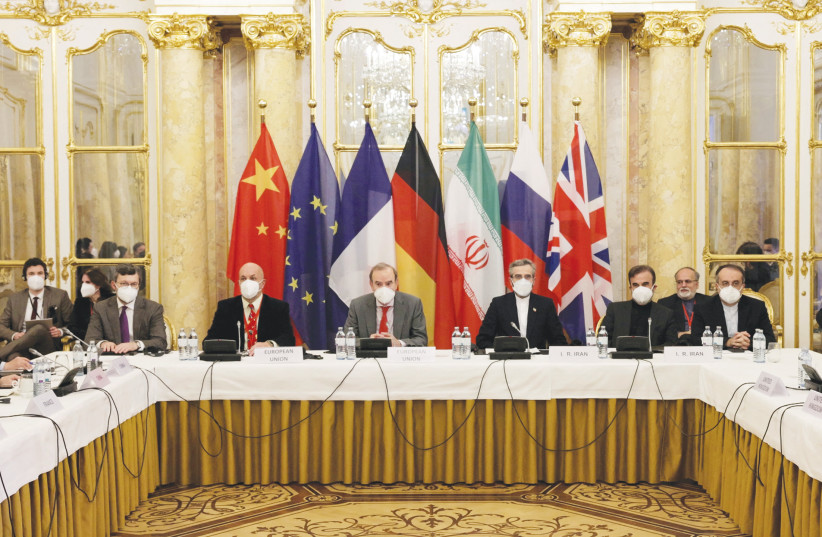Prospects for reaching a nuclear deal with Iran “are tenuous at best,” says Rob Malley, the Biden administration's special representative to Iran.
“If Iran maintains demands that go beyond the scope of the JCPOA, we will continue to reject them, and there will be no deal,” he said in testimony before the Senate Foreign Relations Committee, referring to the Joint Comprehensive Plan of Action, the official name of the nuclear deal.
Malley’s remarks came on the heels of a report by Politico that indicated President Joe Biden had made a final decision not to delist the Islamic Revolutionary Guard Corps from the Foreign Terrorist Organizations list, an Iranian demand that was unrelated to the 2015 nuclear agreement.
“It is not our preference, but we are fully prepared to live with and confront that reality if that is Iran’s choice,” Malley said.
“We will seek a return to the JCPOA as long as we assess that its nonproliferation benefits are worth the lifting of the sanctions we would provide, and we will submit this deal for congressional review if we were to reach it,” he added.
The Iranian government’s actions threaten “the United States and our allies, including Israel,” Malley said.

“Iran continues to support terrorist groups,” he said. “It has an appalling human-rights record, the brutal response to ongoing protests being only the latest reminder. It unjustly detains foreign and dual nationals for use as political pawns.”
“The simple fact is this: As a means of constraining Iran’s nuclear program, the JCPOA was working; leaving it has not,” Malley said. “Under the JCPOA, Iran operated a tightly constrained and monitored nuclear program.
It would’ve taken Iran about a year to make enough fissile material for a bomb, which would’ve given us and our allies the ability to know what Iran was doing and the time to act should Iran make that decision.
Iran continues to support terrorist groups. It has an appalling human rights record, the brutal response to ongoing protests being only the latest reminder.
Rob Malley, the Biden administration special representative to Iran.
"Without those constraints, Iran has been accumulating sufficient enriched uranium and made sufficient technological advances to leave the breakout time as short as a matter of weeks, which means Iran could potentially produce enough fuel for bomb before we can know it, let alone stop it."
“We have no illusion [that with or without] a nuclear deal, this Iranian government will remain a threat. As we have throughout the negotiations, we will continue to strongly push back.”
Meanwhile, the State and the Treasury departments announced new sanctions, targeting an international smuggling and money-laundering network that has “facilitated the sale of hundreds of millions of dollars’ worth of oil for the IRGC Quds Force.”
US Secretary of State Antony Blinken on Wednesday said the United States “remains fully committed to imposing costs on the Iranian regime for its support to terrorist proxies that destabilize the Middle East.
“To that end, today the United States is designating an international oil-smuggling and money-laundering network, led by Iran’s Islamic Revolutionary Guard Corps-Quds Force official Behnam Shahriyari and former IRGC-QF official Rostam Ghasemi, both of whom are designated persons.”
Blinken said the network is backed by senior levels of the Russian Federation government and state-run economic enterprises.
“It has facilitated the sale of hundreds of millions of dollars’ worth of oil for the IRGC-QF and Hezbollah, and it spans several jurisdictions, including Iran and Russia,” he said.
“We will not hesitate to target those who provide critical support for the IRGC or Hezbollah and facilitate their access to the international financial system,” Blinken said.
Former ambassador to the US Michael Oren said: “President Biden’s decision not to delist the IRGC and to hold off renewing the JCPOA is encouraging. But the European Union and elements in the US administration remain determined to delist parts of the IRGC and to reach an even more disastrous deal. Israel must remain diligent and continue to build its case for robust diplomatic and kinetic action.”
Richard Goldberg, a senior fellow at the Foundation for Defense of Democracies, said until a Plan B is being pursued, “we should assume the administration is continuing to negotiate a new and worse nuclear deal.”
“Now that the president has affirmed the IRGC is a terrorist organization,” he said, “Congress should be asking a simple question: How can you lift sanctions on the IRGC’s top financiers, including the Central Bank of Iran and the National Iranian Oil Company – key terrorism sanctions the administration has already offered to suspend?”
Dennis Ross, a distinguished fellow at The Washington Institute for Near East Policy, said the deal is not dead.
“Iran will put pressure on us by ratcheting up their nuclear program, believing that may force us to concede,” he said. “And we will hope that the economic pressures in Iran, with protests over reduced subsidies on basic food stuffs, will lead the Iranians to feel they need sanctions relief.”
“The supreme leader will, of course, not want to make a concession in the current environment for fear of looking weak,” Ross said. “But so long as the administration does not see a better alternative to the JCPOA and the limits it imposes, and so long as the Iranians want sanctions relief, a deal could prove possible in a few months’ time.”
